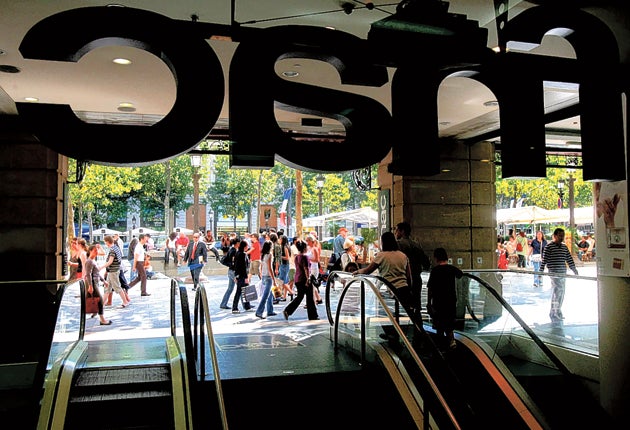John Lichfield: Love and other bombshells

Here is a literary conundrum. A legendary, best-selling French novel, written 60 years ago, has just been published in France for the first time. How can that be? It is a long and fascinating story in which I claim a tiny, walk-on part. More glamorously, there is also a story within the story: the first account of the final love affair of a doomed, British screen idol of the 1930s and 1940s, Leslie Howard. The book in question has never previously appeared in France because its French author thought that it was too naughty for the French. More exactly, Tereska Torres feared that its descriptions of the heterosexual and homosexual love lives of French women soldiers in London during the Blitz might cause offence.
In 1950, her book, loosely based on her own experiences in wartime London, was translated into English as Women's Barracks. It became a pulp classic, the subject of an obscenity trial and sold 4,000,000 copies in the US alone. Now, after 60 years, Tereska Torres, 90, has finally translated her own book from English back into French. The results, Jeunes Femmes en Uniforme (Phebus), have appeared to excellent reviews. Four years ago, I interviewed Ms Torres when she was first considering a French publisher's suggestion that she should re-write Women's Barracks. The original French manuscript had been lost.
Tereska, known in France as the author of 12 other serious and well-regarded books, had always hated her most commercially successful work. "I look on the internet and I learn that I am the literary queen of the lesbians, the person who wrote the first lesbian, erotic pulp novel. I hate it. I hate it," Ms Torres told me at the time. "If you look at Women's Barracks, there are five main characters. Only one and a half of them can be considered lesbian."
The original book is certainly not obscene and not even especially raunchy. I therefore took issue with its author. Women's Barracks was, I told her, a rather moving story of young people searching desperately for love among the bombs. Tereska, twice married and the mother of three children, agreed to translate the book. She then changed her mind. We became friends. I occasionally called on her for tea and cake. I always plugged the virtues of her allegedly wicked book.
Finally, two years ago, she changed her mind again and began working on Jeunes Femmes en Uniforme. On the fly leaf of the copy that she sent me the other day, she generously wrote: "I would have never written this book if not for you." My worst fears have, however, been realised. Tereska has not translated the book. She has torn it apart. The few "naughty bits" are mercifully intact but she has added much more about the exhilaration and terrors and courage of wartime London. She has developed the characters and deepened the story. It is, I admit, a much better book.
Jeunes Femmes en Uniforme also contains a first full account of the real-life love affair between one of Tereska's French women soldier friends – called "Josette" in the book – and Leslie Howard. In his final months before his Dakota aircraft was shot down over the Bay of Biscay in 1943, Howard lived with "Josette" and her illegitimate son in his mansion in Surrey. The co-star of Gone with the Wind was 50. She was in her early twenties. They had, according to Tereska's account, an idyllic romance with very little sex. Anyway, the new version of Tereska's book is so good and so changed that it would be a shame if someone did not translate it back into English.
Colonel Gaddafi's unlikely French connections
The largest cultural supermarket in Paris, the FNAC on the Avenue des Ternes, is 10 minutes' walk from our flat. It is the biggest book-shop in Paris; the biggest seller of what I still insist on calling "records" and "videos"; and usually the best place to buy ink-cartridges or cameras or theatre tickets. My 13-year-old daughter Grace, who recently progressed directly from Disney to 1950s classic films, haunts the DVD section looking for obscure Alfred Hitchcock movies.
Imagine my surprise – and the surprise of the rest of "Bobo" (Bourgeois Bohemian) Paris – to discover that I had been putting money in the pocket of Muammar Gaddafi all these years. The domed FNAC building, once a department store, is owned by Lafico, a Libyan state investment fund. In line with EU sanctions, FNAC is now paying rent, not to Libya, but to the French government. The money has been "sequestered" and might, one day, go to a successor government in Tripoli. One day.
Don't put your father on the stage
French showbusiness is a family business into which children follow their parents. Antoine de Caunes, the comedian and TV presenter, has reversed the trend. At the age of 58, he is appearing on the Paris stage for the first time, 10 years after the debut of his actress daughter, Emma de Caunes, now 34. Mr de Caunes is best known in Britain for mocking "les rosbifs" on C4's Eurotrash. He did a Ricky Gervais last month by insulting fellow TV stars while presenting the Césars, or "French oscars". He especially annoyed the presentatrice Daniela Lumbroso, 50, by describing her, wittily, as "someone who just reads out stuff while smiling". For his first stage role, Mr de Caunes is the star of a one-man show. It is called, unconvincingly, "Un mec sympa" – "a nice guy".
Join our commenting forum
Join thought-provoking conversations, follow other Independent readers and see their replies
Comments
Bookmark popover
Removed from bookmarks